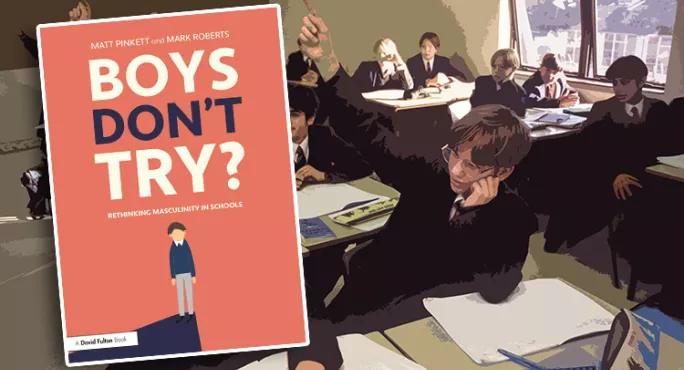- Home
- Book review: Boys Don’t Try? Rethinking masculinity in schools
Book review: Boys Don’t Try? Rethinking masculinity in schools

Boys Don’t Try? Rethinking masculinity in schools
Authors: Matt Pinkett and Mark Roberts
Publishers: Routledge
Details: Paperback, 218pp, £16.99
ISBN: 978 0815350255
We desperately need this book - and more like it. In a data-obsessed education system, the statistics are stark: too many boys, particularly from disadvantaged backgrounds, are falling behind. When they leave school, boys and the men they become are disproportionately more likely than women to be imprisoned, injured and killed or to harm and kill themselves or others. Neglecting the issue is, in some cases, a matter of life and death. Yet while teachers and parents alike are crying out for answers, we may not all like the mirror held up to us by the authors.
In Boys Don’t Try? Matt Pinkett and Mark Roberts directly link boys’ relative educational underachievement to mistaken attempts to aspire to an “outdated, but nonetheless widespread idea” about what it means to be a “real man” and “a brand of masculinity that leaves many boys floundering” - and make no mistake, it is a brand, sold hard yet often unthinkingly, with very real casualties. The message is clear: we have a lot of work to do.
This is an honest, human and reflective approach to rethinking masculinity in schools, based on the authors’ own journeys as students as well as teachers and leaders. Taboos and stereotypes, including their own, are unflinchingly addressed - the book in many ways models the journey of awareness they would like us to take.
Pinkett and Roberts first address popular misconceptions of “boy-friendly” teaching that patronise and underestimate boys. Competitive lessons create losers not just winners, leading to boys’ withdrawal from academic competition as a self-protection strategy: “if I haven’t tried, I haven’t really failed”. Boy-friendly texts perpetuate gender stereotypes: “boys are not a uniform, homogenous mass” and limit exposure to new ideas. Active learning for energetic boys allows discredited learning styles theory to flourish. Get boys onside by engaging with “banter” lowers standards and makes you a “cultural accomplice” to unhelpful stereotypes.
The authors also explore the intersectionality of gender, class and disadvantage, framing the debate from a stance that “our education system is centred on middle-class values”, addressing the underachievement of all disadvantaged students and interrogating ability setting. The Education Endowment Foundation found that “overall, setting or streaming appears to benefit higher attaining pupils and be detrimental to the learning of mid-range and lower attaining learners”.
Teachers are confronted with proof of our own negative bias against boys - “a simple tally of comments revealed 54 positive comments about girls compared with 22 negative […] 32 positive comments about boys compared with 54 negative comments” - alongside our prejudice against children from low-income families: “It’s us we need to focus on”, because with hard-to-reach families “perseverance - not prejudice - gets results”. And those results might include, but not be restricted to, the narrow criteria of attending Russell Group universities.
The pressure for boys to gain acceptance in peer groups over academic achievement are weighed against teacher bias, gender stereotypes and the influence of pornography, as the foundations of misogyny in UK schools and society are explored. Teachers are not only fighting their own internal prejudice, but social stereotyping that features “a dominant strand of masculinity that sees school work and high achievement as effeminate and uncool”. Rather than pander to dominant masculine stereotypes, schools, Pinkett and Roberts argue, must create an ethos of excellence, ensure there is no alternative to hard work in class and address gender stereotypes head on to fight the “peer pressure paradox” that creates hard-working, high-achieving girls but can lead boys to become disaffected, avoiding studious behaviours in order to gain peer acceptance.
There are no quick fixes here, as the societal issues are widespread, entrenched and entangled, but perhaps the most useful ‘pick up and play’ chapters are Chapter 5 on teacher expectations and Chapter 7 “In the Classroom”. Those that will marinate for longer and merit revisiting are the research and reflections on how our interactions with boys make men. Research purists may take issue with how anecdotal and experiential fronts the research, but the authors recognise “it’s easy to look down on anecdotal evidence”, and offer research and ideas that classroom teachers can consider and use straight away as well as a launch pad to further investigation.
First and foremost, Pinkett and Roberts’ work reads as a call to action: instead of “boys don’t try”, perhaps we don’t try hard enough - or are directing our efforts ineffectively. Sustained self-reflection from teachers and parents alike is needed to ring the changes: have you benefited from the “luxury duck feather duvet” protection of the middle classes, do you “see girls as obedient and hard-working, but view boys as disruptive and uninterested in their education”?
To move forward, we must accept our biases in order to address them and focus relentlessly on quality teaching: “High challenge. High expectations. No gimmicks. No shortcuts”. And, more than anything, remember that boys are all individuals: as my nine-year-old son expressed it when I asked him about the subject when writing this review: “There’s not just one kind of boy or man though, is there? So why treat us like there is?”
Stephanie Keenan is head of English at Ruislip High School. She blogs here and tweets @HeadofEnglish
For more on boys’ underachievement and the reasons behind it, read this week’s Tes, available now at all good newsagents. You can subscribe here.
Keep reading for just £1 per month
You've reached your limit of free articles this month. Subscribe for £1 per month for three months and get:
- Unlimited access to all Tes magazine content
- Exclusive subscriber-only stories
- Award-winning email newsletters



